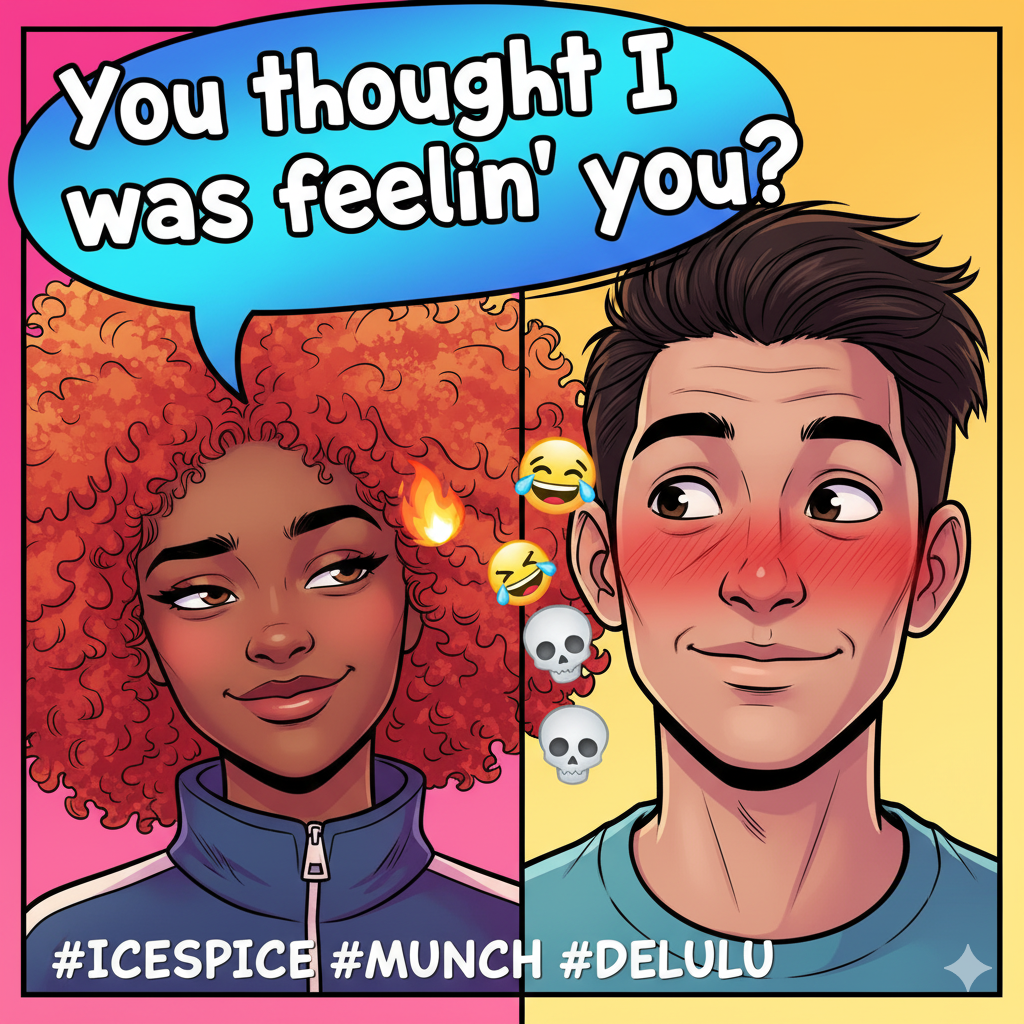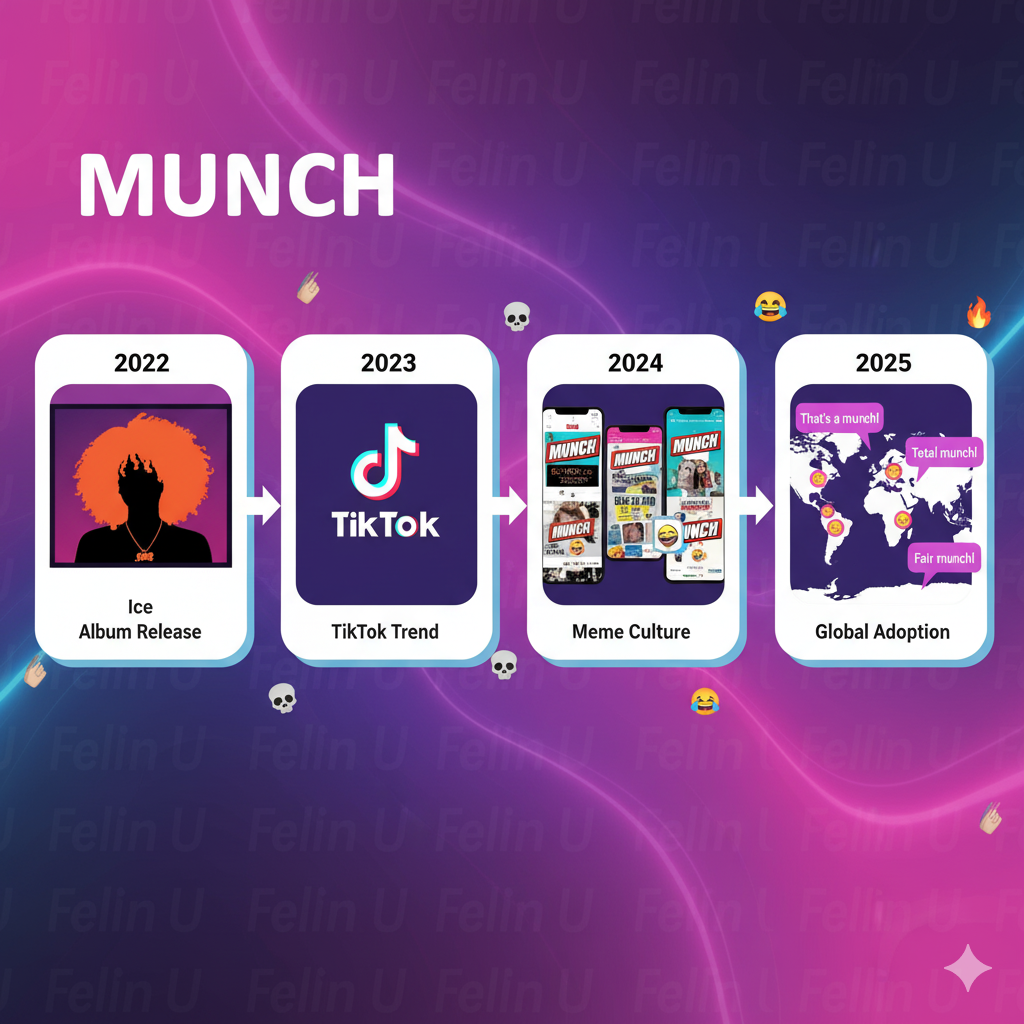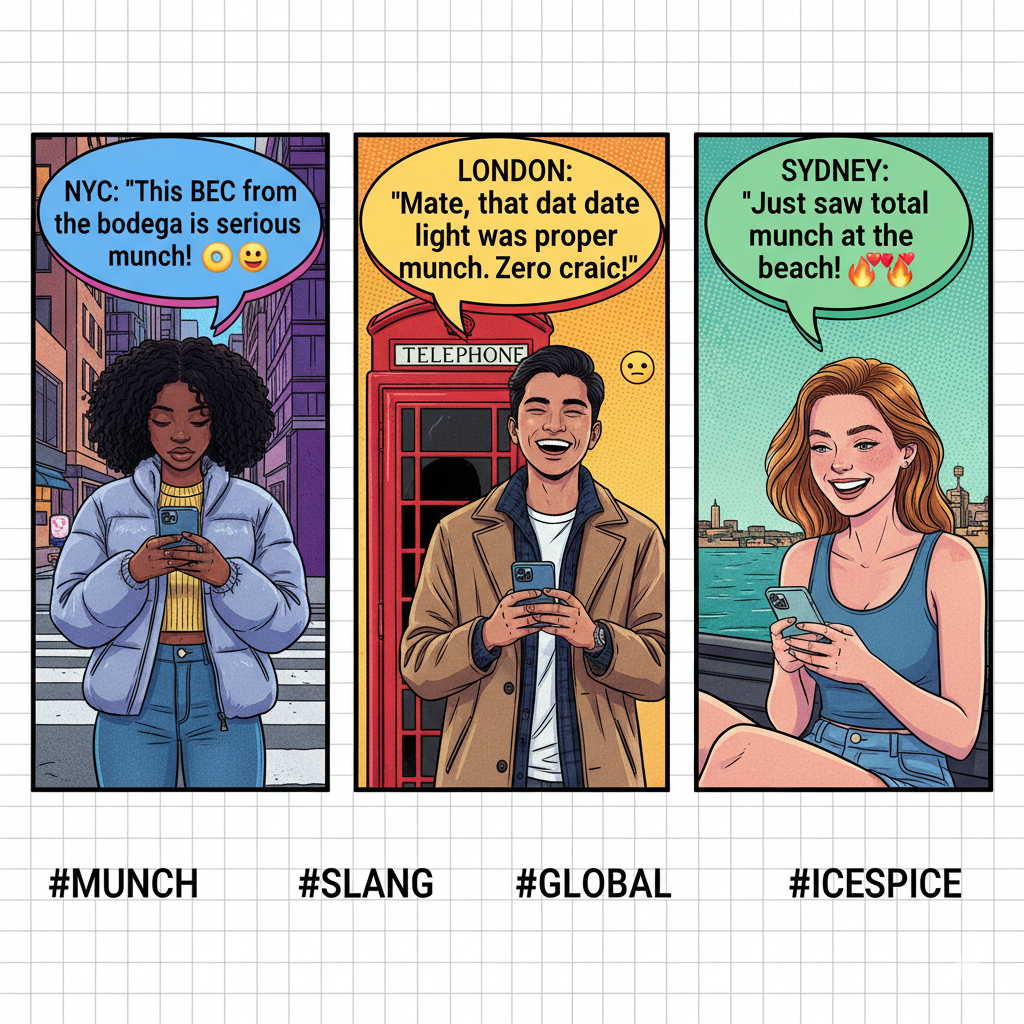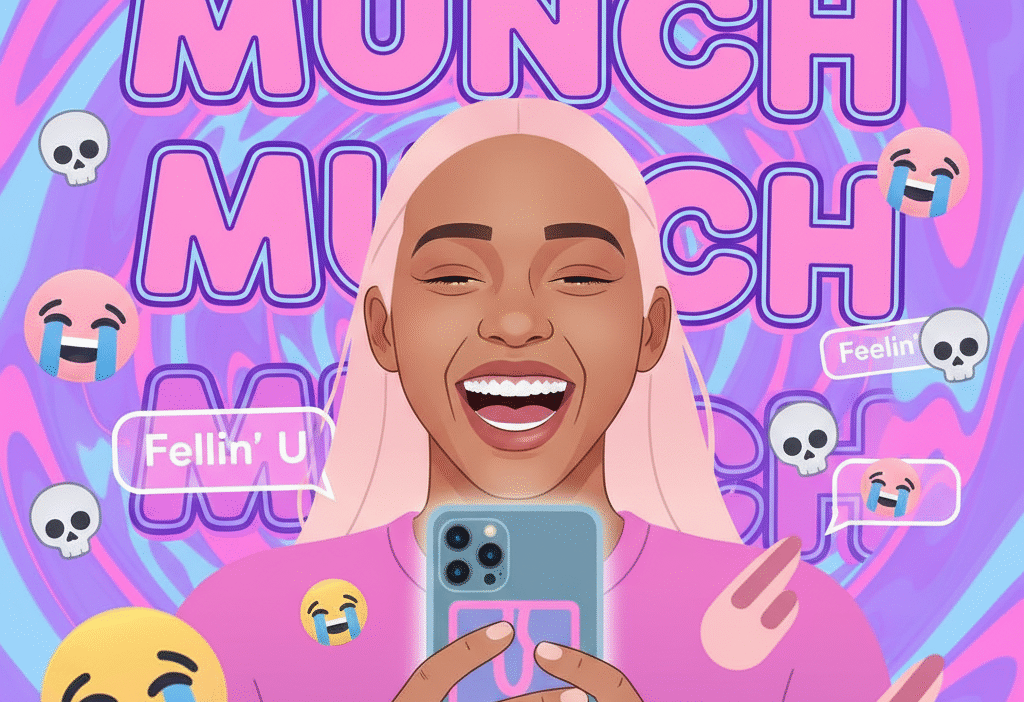If you’ve spent time scrolling TikTok or watching short-form comedy clips, you’ve probably seen someone caption a post with “He’s a munch 😭” or “Don’t be a munch.”
It’s short, funny, and somehow perfectly expresses that one person who tries too hard.
In 2025, “munch” is one of the most iconic slang words of the decade — born in hip-hop, raised by TikTok, and now part of everyday online conversation.
But what does it really mean? Let’s decode its origin, tone, and cultural impact.
The True Meaning of “Munch” in Slang

In slang, “munch” describes someone who gives too much energy, attention, or affection — especially when it’s not appreciated.
It’s often playful or teasing, but it can also carry a hint of mockery depending on tone.
The term went viral after rapper Ice Spice dropped her hit “Munch (Feelin’ U)” in 2022, where she famously said:
“You thought I was feelin’ you? That [expletive] a munch.”
Here, a “munch” refers to a guy who’s infatuated, maybe even obsessed — but not being taken seriously.
In simpler terms, a munch is someone who tries way too hard for someone who isn’t into them.
Over time, though, the slang evolved. By 2025, being a “munch” isn’t always an insult — it’s often self-aware humor or a badge of honesty.
Examples in Modern Use
- “He bought her flowers again? Bro’s a munch 😭.”
- “I know I’m a munch — I can’t stop simping.”
- “She’s a munch for her cat, not even people 💀.”
The tone can shift from lighthearted teasing to affectionate self-mockery depending on who’s speaking — a sign of just how flexible slang has become in the digital age.
How “Munch” Spread Across the Internet
“Munch” took off through TikTok, Twitter (X), and music memes, with creators turning Ice Spice lyrics into captions, edits, and jokes.
Its catchy, funny energy made it perfect for reaction videos and dating humor.

The spread followed a pattern typical of Gen Z slang:
- Origin in AAVE (African American Vernacular English) — used casually in NYC hip-hop circles.
- Mainstream Breakthrough via Music — Ice Spice’s viral hit in 2022.
- TikTok Amplification (2023–2024) — meme edits, lip-syncs, “POV” jokes.
- Global Adoption (2025) — now used from New York to London to Sydney in slightly different tones.
Today, “munch” means more than a word — it’s a social signal for emotional imbalance, irony, and digital self-awareness.
Global & Gender-Neutral Usage
Though “munch” started with male-directed slang, it’s now used across genders and regions.

- In the UK, it can describe someone too loyal or emotionally available: “She waited for him again? That’s so munch of her.”
- In Australia, it’s used more humorously in friendships: “You brought snacks for everyone? You’re such a munch 😂.”
- Among women online, it’s been reclaimed as a self-aware joke — a way to laugh about caring too much without shame.
This evolution shows how slang adapts — from subculture roots to global memes that cross boundaries of gender, humor, and tone.
Cultural and User Experience Context
Understanding “munch” requires more than translation — it’s about emotion and timing.
In digital culture, humor and vulnerability often mix. “Munch” captures that exact balance — it mocks obsession but also normalizes it.
People use it to make fun of themselves, yet it’s secretly a term of emotional honesty.
Culturally, it highlights three major internet trends:
- The rise of vulnerability online: People proudly admit to caring too much — with humor as a shield.
- AAVE’s cultural influence: Black American speech patterns continue to define global slang, shaping meme language worldwide.
- Digital empathy: Modern humor isn’t about hiding feelings; it’s about owning them with irony.
So when someone calls you a “munch,” it’s not always judgment — sometimes it’s solidarity.
How to Use “Munch” Naturally
To sound authentic when using “munch,” focus on tone and timing.
Text Example:
A: “You drove two hours just to see him?”
B: “Yeah… I’m a munch, I know 😭.”
TikTok Caption:
“When he leaves you on delivered but you still text good morning 😭 #munchbehavior”
Group Chat Joke:
“You’re helping your ex move? Bro, MUNCH ALERT 🚨.”
Tone Tips:
- All caps (“MUNCH”) = exaggerated teasing or dramatic flair.
- Lowercase (“munch”) = soft, self-deprecating humor.
- With emojis (😭💀) = signals irony and playfulness.
Tone determines meaning — it can turn an insult into camaraderie or humor.
Modern Meanings of “Munch”
By 2025, “munch” has expanded far beyond relationships. It now applies to friendships, fandoms, and even work culture.
| Context | Meaning | Example |
|---|---|---|
| Romantic | Someone overgiving in love | “He’s such a munch for her 💀.” |
| Platonic | A helpful friend | “You made her notes? Munch energy.” |
| Self-Ironic | Admitting you care too much | “Yeah I’m a munch and I own it 😂.” |
| Cultural Meme | Lighthearted identity humor | “Munch behavior detected 😭.” |
It’s short, funny, and emotionally layered — making it ideal for the fast, meme-driven rhythm of online communication.
Advanced Linguistic and Cultural Insights
The word “munch” isn’t just slang — it’s a lens into how Gen Z expresses emotional realism.
Modern slang often reflects deep cultural values masked as humor.
- Authenticity Over Coolness: Unlike older slang, “munch” embraces imperfection — it’s cool to be real, even if that means being vulnerable.
- Algorithmic Amplification: TikTok and X reward emotional humor — videos using “munch” gained more visibility through engagement-driven algorithms.
- Cultural Appreciation & Credit: Recognizing its AAVE roots is vital; giving linguistic credit prevents cultural erasure.
- Emotional Transparency: Younger users use slang like “munch” to admit feelings while staying funny — a blend of irony and honesty that defines Gen Z communication.
This is why “munch” lasted longer than typical internet slang: it resonates emotionally, not just comedically.
Common Mistakes to Avoid
- Using it in serious or professional contexts.
It’s informal — best kept to social or creative settings. - Ignoring tone or origin.
Without understanding AAVE influence, usage can feel tone-deaf. - Overusing it.
Authentic slang thrives on timing; overdoing it kills humor. - Misapplying it.
Don’t call someone a munch casually if you’re unsure of your relationship — it can still sting.
- Prioritizing authentic explanations over trend-chasing.
- Using verified slang sources like Urban Dictionary and TikTok data.
- Blending cultural context with linguistics expertise for credibility.
- Maintaining a trustworthy and user-focused tone.
Conclusion
“Munch” began as a diss, but evolved into a symbol of emotional honesty in digital life.
It’s a word that laughs at neediness yet celebrates it — because caring too much, trying too hard, or being “down bad” is part of being human.
From Ice Spice’s lyrics to TikTok humor, “munch” now represents the humor, self-awareness, and cultural mix that defines online expression in 2025.
So, if someone calls you a “munch,” take it as a moment of connection — proof that being real is still in style. 💅
What do you think — is being a munch an insult or just emotional truth? Let’s hear your take.
FAQs
Q1. What does “munch” mean in slang?
It means someone who gives too much attention or affection — often in a playful or self-aware way.
Q2. Who started the term “munch”?
The word was popularized by rapper Ice Spice in her viral 2022 track “Munch (Feelin’ U).”
Q3. Is being a “munch” bad?
Not necessarily. It started as an insult, but now it’s often used humorously or affectionately.
Q4. Can women or anyone use “munch”?
Yes — it’s now gender-neutral and global, used by anyone expressing overgiving behavior.
Q5. What are similar slang words?
Similar phrases include “simp,” “down bad,” “lover boy/girl,” and “softie.”





